It can be said that humans have a bit of a short term view of things. We’re concerned about the end of summer, the next school year, and maybe even retirement. But these are just a blink of an eye in cosmic terms. Let’s really think big, stare forward in time, and think about what the future holds for the Universe. Look forward millions, trillions, and even 10100 years into the future. Let’s consider the end of everything.
End of Humanity – 10,000 years
Modern humans originated in Africa about 200,000 years ago. Since then, we’ve gone on to inhabit every single corner of the globe. But this is just temporary. The vast majority of every species that has ever lived on Earth is now extinct. To think that humans can avoid the fate of every other creature is arrogant. Like all life on Earth, our time is limited. How long will we last?
There are many natural and man made disasters that could wipe us out. From an asteroid strike to worldwide pandemic; global warming to a nearby supernova detonation – there are many ways we could go. Perhaps we’ll wrap it up in a mass extinction event, such as the one that killed the dinosaurs 65 million years ago, or “the Great Dying”, 251 million years ago that killed 70% of land species and 96% of all marine species.

Perhaps another species (intelligent cockroaches, rats) will evolve, and out compete with us in our niche. Or maybe we’ll engineer our robotic replacements.
But a species can last tens or even hundreds of millions of years. So how can we predict when our number will be up?
There’s no way to know, but there’s a calculation that can help. It’s called the Doomsday Argument, developed in 1983 by astrophysicist Brandon Carter. According to Carter, if you assume that half of the humans who will ever live have already been born, you get approximately 60 billion people. If you assume that another 60 billion are yet to be born, our high population levels only give us another 9,000 years or so. Or more precisely, there’s a 95% chance that humanity will have ended by the year 11,000.
There are other calculations, but they give similar amounts, ranging from a few thousand to a few million years.
That’s a long time, but not long enough to appreciate the future the Universe has in store for itself.
End of Life – 500 million years – 5 billion years
We thank the Sun for giving us energy. Without it, there’d be no life on Earth. It’s ironic, then, that the Sun will eventually kill all life on Earth.
That’s because the Sun is slowly heating up.
One of the most fascinating books about this topic is The Life and Death of Planet Earth by Peter Ward and Donald Brownlee. In their book, they chronicle how Sun’s energy output is slowly increasing. In as soon as 500 million years, temperatures on Earth will rise to the point that most of the world will be a desert. The largest creatures won’t be able to survive anywhere but the relatively cooler poles.
Over the course of the next few billion years, evolution will seem to go reverse. The largest organisms and least heat tolerant animals will die out, leaving hardy insects and bacteria. Finally, it’ll be so hot on the surface of the Earth that the oceans will boil away. There’ll be no place to hide from the terrible temperatures. Only the organisms that live deep underground will survive, as they have already for billions of years.
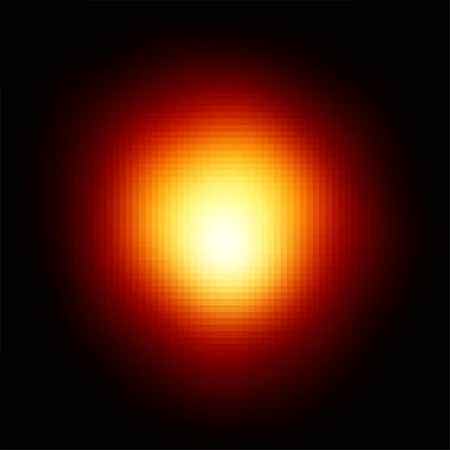
End of the Earth – 7.5 billion years
As mentioned above, we exist because of the Sun’s good graces. But as our star nears the end of its lifetime, it’ll take our planet out as it goes; one way or another.
In approximately 5 billion years from now, the Sun will begin the final stage of its life, consuming the last of its hydrogen fuel supply. At that point, gravity will force the Sun to collapse, and only a small amount of hydrogen will remain in a shell wrapped around the star’s core. It will then expand into a red giant star, consuming each of the inner planets: first Mercury, then Venus, and finally encompassing even the orbit of Earth.
There is a controversy about whether or not a red giant Sun will actually burn up the Earth. In some scenarios, the change in the Sun’s density as it expands causes the Earth to spiral out away from the Sun, keeping out of reach. In another scenario, the Sun’s outer envelope will enclose the Earth. The additional friction will slow the Earth down, causing it to spiral down into the Sun.
Whatever the outcome, the Earth will be scorched to a cinder, and effectively destroyed, 5 billion years from now.
End of the Sun – 7.5 billion – 1 trillion years
When the Sun becomes a red giant, that’s only the beginning of the end. With the end of its hydrogen, the Sun will have switched to fusing helium, then carbon, and finally oxygen. At that point, our Sun will lack the gravity to continue the fusion process. It will shut down, and shed its outside layers to form a planetary nebula, such as the ring nebula we can see in the night sky. It’ll then settle down to live out the rest of its days as a white dwarf.
It will still retain most of its mass, but have a size no larger than the Earth’s diameter. Once yellow-hot with the heat of fusion, the Sun will slowly cool down over time. Eventually, its temperature will match the background temperature of the Universe and it will become a cold black dwarf star – an inert chunk of matter floating in the darkness of space.
Even the oldest white dwarfs still radiate at several thousand degrees Kelvin, so the Universe hasn’t been around long enough for black dwarfs to exist.. yet. But give the Sun another 1 trillion years or so, and it should finally become a cold black dwarf.
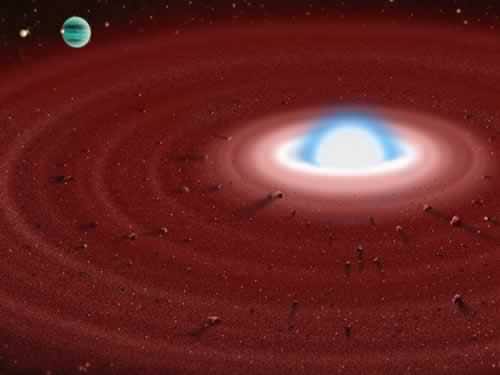
End of the Solar System
Even though the Sun will have burned out billions of years from now, the planets that weren’t consumed will remain. Perhaps even Earth will join that group. Certainly Jupiter, Saturn, the rest of the outer planets and the Kuiper belt objects will remain orbiting for eons.
A recent discovery published in the journal Science, reported that astronomers had discovered a disk of rapidly rotating metallic material orbiting a white dwarf. Researchers built a simulation where they put hypothetical planets in orbit around a dying star, and found that the star’s death wreaked havoc on the stability of a star system. Changes in the mass of a star causes planets to collide, and rearrange their orbits. Some spiral into their star, while others are ejected into interstellar space.
Once all these new gravitational interactions are worked out, all that might remain of our solar system is the white dwarf remnant of our Sun and the rapidly rotating disk of planetary wreckage surrounding it. Everything else will be lost to interstellar space.
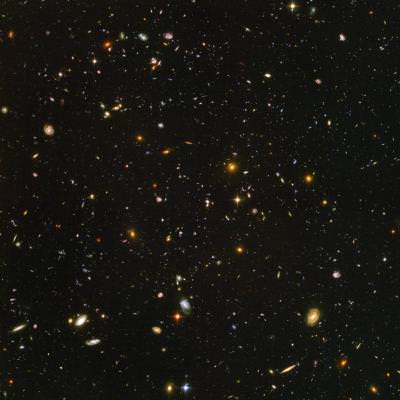
End of Cosmology – 3 Trillion Years from Now
The Universe acts as a natural time machine. Since light moves at the speed of, well, light, we can look at distant objects and see them how they looked in the past. Look to the very ends of the visible Universe, and you see light that was emitted billions of years ago, shortly after the Big Bang.
It’s handy, but there’s a problem. That mysterious dark energy force, which is accelerating the expansion of the Universe is making the most distant galaxies move faster and faster away from us. Eventually, they will cross an event horizon and appear to be moving away from us faster than the speed of light. At this point, any light emitted by the galaxy will cease to reach us. Any galaxy that crosses this horizon will fade away from view, until its last photon reaches us. All galaxies will disappear from view forever.
According to a new research paper by Lawrence M. Krauss and Robert J. Scherrer, future astronomers living 3 trillion years from now will only see our own galaxy when they look into the night sky.
This accelerating expansion has another consequence as well. The cosmic microwave background radiation, which astronomers used to discover evidence of the Big Bang will have faded away too. Not only that, but the abundance of chemicals, which precisely match the amounts theorized for the Big Bang will be hidden by subsequent generations of stars.
And so, 3 trillion years from now, there won’t be any trace of the Big Bang. No clues for future cosmologists to recognize that the Universe we live in started from a single point, and has been expanding ever since. The Universe will seem static and unchanging.
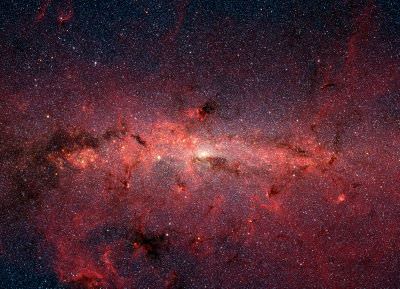
End of the Milky Way
Galaxies collide. All you have to do is look out into space with a telescope and see the fate that awaits our galaxy. In all directions we can see the interactions between the gravity of various galaxies. At first the encounters are violent; galaxies tear at each other, stripping off material, and generating huge swaths of star formation. The dormant supermassive black holes at their centres spring to live and become active galactic nuclei, gobbling up the newly delivered material.
Our future merger partner is barreling towards us right now: Andromeda. In approximately 2 billion years from now, our two galaxies will collide, and then pull apart. Then they’ll collide again and again until they settle down into a new, larger galaxy: Milkomedia. The twin supermassive black holes will orbit one another, and eventually merge together into an even more massive black hole.
Our position in the galaxy will change; we’ll probably be pushed out to the outer reaches of the galaxy’s halo – at least 100,000 light years from the centre. Since the Sun will still have billions of years left, some future form of life on Earth might be around to watch these events unfold.
The merger process will be complete approximately 7 billion years from now.
That’s not the end of the galaxy, though. It will still be an island in space, with stars orbiting a central core. Over a long period of time, though, estimated to be between 1019 1020 years. The galaxy will erode, with all the stars escaping into intergalactic space.
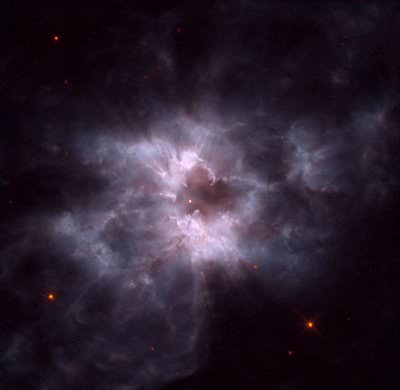
End of Stars – 100 trillion years from now
We can look out into the Milky Way and see stars forming all around us. There is still enough remaining gas and dust in the Milky Way to create whole new generations of stars. But when we look at other galaxies, we can see older, elliptical galaxies which have already used up their free gas and dust. Instead of the bright, hot stars we see in star forming regions, these aging red galaxies are cooling down.
One day there won’t be newly forming stars at all. And then one day, the last star will use up the last of its hydrogen fuel, become a red giant and then fade away to a white dwarf. Even the dimmest stars, the cool red dwarfs will use up their fuel – although, it might taken another 10 trillion years or so. They too will turn into black dwarfs.
And so, in about 100 trillion years from now, every star in the Universe, large and small, will be a black dwarf. An inert chunk of matter with the mass of a star, but at the background temperature of the Universe.

The End of Regular Matter – 1030 years
So now we have a Universe with no stars, only cold black dwarfs. There will also be neutron stars and black holes left over from the time where there were stars in the Universe. The Universe will be completely dark.
A future observer might notice the occasional flash, when some object interacts with a black hole. Its matter will spread out into an accretion disk around the black hole. And for a brief period, it will flare up, emitting radiation. But then it too will be added to the mass of the black hole. And everything will go dark again.
Chunks of matter and binary black dwarfs will merge together creating new black holes, and these black holes will be consumed by even larger black holes. It might be that in the far future, all matter will exist in a few, truly massive black holes.
But even if matter escapes this fate, it’s doomed eventually. Some theories of physics predict that protons are unstable over long periods of time. They just can’t last. Any matter that wasn’t consumed by a black hole will start to decay. The protons will turn into radiation, leaving a fine mist of electrons, positrons, neutrinos and radiation to spread out into space.
Theorists anticipate that all protons in the Universe will decay over the course of 1030 years.
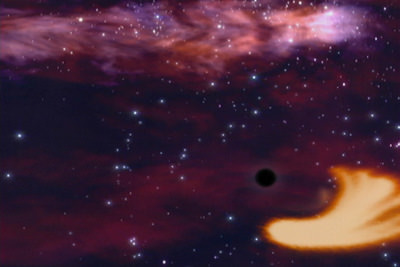
End of Black Holes – 10100 Years
Black holes were thought to be one-way streets. Matter goes in, but it doesn’t come out. But famed astrophysicist Stephen Hawking turned that concept on its head with his theory that black holes can evaporate. It’s not much, and it’s not fast, but black holes release a tiny amount of radiation back into space.
As it releases this radiation, the black hole actually loses mass, finally evaporating away entirely. The amount of radiation increases as the black hole loses mass. It’s actually possible that it could generate a final burst of X-rays and gamma rays as it disappears completely. Future observers (who survived their protons decaying) might see the occasional flash in an otherwise dark universe.
And then in about 10100 years, the last black hole will be gone. All that remains is the radiation emitted.

The End of Everything – 10100 years and beyond
When the last black hole evaporates, all that will remain in the Universe are photons of radiation, and elementary particles that escaped capture by black holes. The temperature of the entire Universe will reach a final temperature just above absolute zero.
Dark energy may play some future role, continuing the expansion of the Universe, accelerating each of these elementary particles and photons away from each other until they’re effectively cut off from one another. No future gravity will bring them together again.
Perhaps there will be another Big Bang someday. Perhaps the Universe is cyclical and the whole process will start up again.
Perhaps it won’t, and this bleak future of a cold, dead Universe is all that awaits us. It’s not happy, but it’s awe inspiring to consider the long future ahead, and helps us appreciate the vibrant age we live in today.

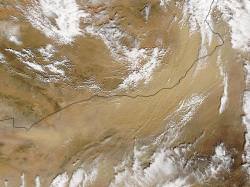
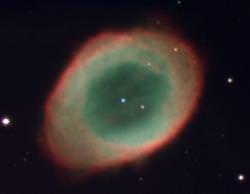
Nice imagined story. It’s like talking about nothingness in billion years. But the thing is that the principle of change is infinite, the “I”, the “self” will always be eternal. Nothingness is nothingness, that’s all. It cannot exist because it’s nothingness. “Existence”, “something” are eternal. If universe collapses and is dead, there will be another thing, which we don’t what it is, and is beyond our imagination.
Agreed Jeff. The author says it’s “arrogant” to think that humans can avoid going extinct like every other species. Maybe, but isn’t it also arrogant for scientists to believe they can actually predict what’s going to take place in the universe over the next 10^100 years? Pullease, they need to contemplate questions down here on Earth they might actually have a shot at answering.
There are general predictions that people can make with laws of physics when the number of significant variables is limited. A scientist can predict the time of the next solar eclipse to the exact second at a given location on earth but fail to predict tomorrow’s weather. That does not mean that the scientist cannot predict any event beyond one day. Looking at entropy, for example, it is logical that since the entropy of the universe continuously increases and yet there is a limit, there will come a time when that limit is reached. There simply is no other path.
To say that one should only focus his or her energy on the consideration of issues in every day life is what impedes scientific discovery and innovation, which requires thought that is beyond the present. Several hundreds of years ago when people were slaughtering one another with swords and arrows atop castles they never thought that one day they would send objects into space, yet scientists progressed in their thought (ahead of the requirements of their time) and today we are using a multitude of communication methods based on satellites. Hence perhaps the examination of the future of the universe isn’t so absurd after all.
I wonder if all the matter in the universe ends up in black holes, and all the black holes eventually merge into one super super super massive black hole, if that might compress all of matter into a single point and cause a new big bang to happen! Tada!
George, you have the voice of intelligent reason. Good article.
We only have a few more years to see ‘IF’ the mysteriously “Plant X” shows up in the night skies.
They say: December 23, 2012 is the end.
I Wonder what the politicians are going to say if we
see it coming in the next couple of years and how
they plan to cover “THAT UP”?!?!?!
Surely god will press the Reset button if that happens.
Funny how, despite the serious problems with standard model physics (dark energy, gravitons, Higgs boson), people still feel free to make apocalyptic predictions based on it. It’s an amusing conceit. “There are more things in heaven and earth, Horatio – er Fraser, Than are dreamt of in your philosophy.”
To Jeff Lloyd: Your ramblings are that of a drunken middle school drop out. Sorry, but I call them as I read them.
And to the authors regurgitated theory that we have 10,000 years to live before we are wiped out….
The difference between us and the dinosaurs is that the dinosaurs didn’t have space ships, technology, etc and had no way of stopping or dealing with the extinction that lay ahead.
Another “doom and gloom for the human race” article. Yes it’s true that’s most species on earth have gone extinct and the rest most certainly will in the future. However, the author failed to realize two distinct facts about the human race. First, of all the species that have evolved on this planet, we are the first that are in a good position to “buck the system”. Our unique evolution has given us the skills and knowledge to help us escape many of the disasters that have wiped out the species from this planet’s past. Not all, but our odds increase as we develop new technologies and new advances in science. Right now scientists are working very hard to come up with a planetary defense system that will protect us from large asteroid impacts. And second, we are the only species on earth that will likely populate other planets (unless we take other species with us). By spreading out beyond the boundaries of Earth, or even our solar system, we will increase the likely hood that the human race will live on far beyond the expectations of any flat calculation. Simply put, the human race doesn’t fit the same profile as other species on earth. If you’re going to calculate the end of the human race, you need to factor in its artificial and self-made evolution – which is moving very quickly.
Everything is cycling, and so is the universe. We can see it everyday. I believe that if all the matter and energy was at one point at one time, it will be again… its just going to be a little while. In the meantime theres a lot of net porn to look through. bye!
If we treated the planet better we wouldn’t have to worry about all the doom and gloom. In the end its the greed of the world that will do us in, much sooner before the sun burns out.
http://www.scottmatheson.com
Thats Great
Look http://ooyes.net
Regards
A key question is whether the amount of dark energy is constant, as Einstein thought, or whether it will grow or decay over time. According to physicist and author Paul Davies, of Macquarie University’s Australian Centre for Astrobiology, dark energy is linked to the quantum vacuum. Space may appear to be a vacuum, but on the subatomic level nothing is ever empty: quantum particles can spontaneously appear out of and vanish into nothingness. The amount of antigravity generated in a quantum vacuum may be minuscule, but multiply it by the size of the universe and you have a fair bit.
All of these predictions ignore the place of intelligence. Granted, entropy doesn’t seem likely to be able to be reversed (but who knows), but it’s perfectly within the realm of physics to lengthen the life of a star, or move the Earth into a wider orbit. Humanity may very well survive for billions of years. We may no longer be meatbags (those robotic bodies he mentioned sound nice) but humanity need not die off any time soon.
Drmoroe30
We don’t have space-ships, either. Getting to the moon was a great feat, but this does not make us “space-faring”. Your trust in our technology is adorable, but you have to remember that we are not capable of seriously impacting anything in this planet. (Aside from blowing up all the available nuclear warheads, that is.) Even a relatively tiny asteroid could mean the end of us; and we haven’t talked about other threats, like a supernova in our neighborhood. The chances are low, I give you that – but given enough time, it’s just a matter of when. And let me tell you: we can’t do anything.
And as for the futility of trying to predict the future based on our incomplete knowledge, I can just ask one thing. Why bother with anything, then? We know precious little about how the human body works, yet I suspect you all are running to the doctor if you get sick. We work what we have. When we know more we’ll change these models. That’s it.
Al;l of these theories about the end of the Universe. Does God figure anywhere?
I enjoyed your article! Thank you~
i will be in heaven
I don’t know angryrat. It is still extremely early for us, consider that most technological advances relative to human history have happened in the past 100-150 years, just give us a few extra thousand and only time will tell what we can accomplish.
I’m inclined to believe Ray Kurzweil’s predictions, humanity will merge with machines and consciousness will move beyond the limitations of our organic bodies. After that, who knows.
what is Dark energy and how fast the speed of pitch black travel ? if i was in darkness can i be anywhere at one time because i am in darkness and there is no light that makes me recognize where i am?.
does objects travel faster if they were nearer mass amounts of light ?
Isacc Asimov wrote a short story about this in 1956. Thought it sounded familiar. Six pages long. Here:
http://www.multivax.com/last_question.html
Your fatalism seems a little misplaced, angryrat. Basic technology that we take for granted today would seem like impossible magic five hundred years ago. If we manage to overcome a few technological hurdles in the here and now then there’s really no limit to what humanity could achieve in the next five hundred, thousand, or six-thousand years.
It’s a great article… but also i noticed a small spelling error on the segment that says “spring to live and become active galactic nuclei” I’m sure you meant
Spring to Life… but it is still a great article.
Doesn’t matter if humanity jumps to another planet, star system, galaxy or another part of the universe…. looks like heat death is inevitable anywhere in the universe….. Asimov covered it best in possibly his best short story – The Last Question – http://www.multivax.com/last_question.html
I am sure some astrophysicist will bring me up to speed, but wasn’t it only a few years ago the latest data said the universe was now contracting – not expanding? If that still holds true then the scenarios given for the end of the universe are not accurate. This would also lend credence to the theory that the existence of the universe is cyclic (all matter again becomes compressed into a tiny ball followed by another big bang).
Overall, a good article. Anyway you look at it our world, our species and our universe are doomed. It is quite interesting to contemplate the various ways we could be doomed.
There is always divine intervention…………… or are the divinities part of the doomed universe destined for extinction as well.
Interesting front page digg article Fraser. I would agree that the extrapolation is only valid insofar as our current understanding of physics and observations of the universe at large. Dark energy and matter are both fairly recent modifications to this understanding, and we may resolve other details still.
An interesting idea that the recession of galaxies would appear to be super-luminal from each other from a given perspective. I wonder if this in itself would account for some of the observed large scale gravitational anomalies observed? eg. there are galaxies that have accelerated to super-luminal speeds relative to us, but not to observable galaxies, and so we witness only the gravitational effect.
There is another interesting read on the physics of the long-term cyclical nature of the universe. “Unveiling the Edge of Time” by John Gribben has a section detailing the physics of the periodicity of space-time and loop-holes in Plank time scales that allow for the entropy of the universe to be reset to zero. In other words, the universe expands until all that remains are black holes. Eventually, the universe collapses on itself into forming a super-singularity. The entropy of the universe is reset to zero with the enormous mass crunch, and then the singularity becomes a space-time spewing white hole with another “Big Bang”.
I don’t say which long-term universal model to which I subscribe, but this one is certainly an interesting look into another scenario. Relativistic physics are fun, no?
this is so emotragik
i remember a book of paul andersen … i think
some guy in 70`s with his time machine go to the future something happen and bla bla bla
some smartass godlike creature tell him to keep moving to the future … to the end . he skip the big bang … and what he see was a new star formation then whole earth , amazing book but i forgit the autor and title
plz if somebody know it ?
I think there is way more that we dont know than do about the universe, predictions like this are almost certainly not true. As we cannot even identify what 80% of the universe even is (dark matter/dark energy) I think it is safe to say we cannot even begin to understand how it plays into the rest of normal matter.
Cool vision though, certainly makes humanity look like a flash in the pan. Granted, assuming we survive eventually we would reach a Type IV civilization, which in theory we would have the power to create our own stars and escape to another universe when this one ends.
How can you represent the Doomsday Argument as providing some kind of “proof”? For Carter’s argument to work, you have to assume that half of all humanity has already been born, but who came up with that? It’s completely arbitrary. You can just as easily “assume” that 95% or 5% of humanity has been born.
It’s a silly game to try and attach scientific proofs on to guesses about the future. On a large scale you can predict the future of a galaxy, but with the human race there are so many unknowns that it’s only ever guesswork.
The human existence is a moment of momentum , knowing that the old universe is already gone so we living and learning to boldy go where no man has gone before
and that is a hole new universe.
No article on the death of the universe is complete without Asimovs masterpiece, The Last Question.
http://www.multivax.com/last_question.html
I seriously question this widespread assumption that blackholes will evaporate. This is based on the (in my humble opinion)rather shaky assumption that matter and antimatter can spring out of the vacuum spontaneously, which in turn is based on the Heisenberg uncertainty principle and QM. QM is seriously flawed (measurement problem etc.), and there is ZERO empirical evidence supporting the uncertainty principle for single particles (only for ensembles of particles). QM is an approximate theory that provides probabilities for the properties/behavior of particle ensembles. It is not fundamental, and it does not describe the behavior of single particles. How can a theory which is an approximation for ensembles (such as stat mech can be an approx for deterministic, newtonian single particles) be used to describe single particles from a theoretical standpoint? It can’t, and that is why this black hole evaporation (and Hawking radation) is all wrong. That is, in my opinion.
And I’ll add, yes, sure, QM has lots of emipirical evidence supporting it, but in fact if you really look, you’ll see there is ZERO evidence for single particles. There are only claims for position/momentum uncertainty (or time/energy) on particle ensembles. As you maybe can tell, I think Einstein was right and that QM is wrong (but, I do think that QM has some significant parts of the “right” theory…it is undeniable that its predictive power is tremendous for ensembles). This is also the reason (or one of the reasons) that QM and general relativity don’t mix, because QM does not provide a fundamental description of single quantum systems.
This article could be boiled down to: big bang, expansion, magical acceleration which we don’t understand, followed by an ultimate question mark because we don’t know anything about “dark energy” or “dark matter”. This article is so premature it is almost 100% worthless, it is much closer to science fiction in my opinion. Nonetheless, I enjoyed reading it.
Only the Wizard’s of the 3rd great Wizard Council can save us, I suppose.
Wizards*
Damn typing abilities…
Good read. People need to seriously relax and take this as a possibility. Our generation will not be even close to claiming space but it better hurry up since we are using resources for stuff like cars =/
Very interesting read!
j hindmoore:
“Al;l of these theories about the end of the Universe. Does God figure anywhere?”
The beautiful reality of science is it will never ask for anybody’s faith, all it asks for is your eyes.
Great read. We’ve all heard the story before, in one way or another….but it’s good to be reminded that the odds are stacked against us, and we’re all in this together. It’s easy to sit back and take the approach of “Well, I’ll be gone before it’s a real issue,” but we must remind ourselves that some day people won’t be gone when the “real issue” finds them. We must never cease asking the hard questions, taking on the most difficult challenges, and being innovative enough to solve them.
Our great arbiters of truth have spoken. Kneel before them and digest if you can you plebs their inane ramblings on universal discourse.
I wonder what the great bard Terrence Mckenna would have thought of this? Novelty is a process of accretion and spirituality is a process of unfoldment. Listen up all ye MATERIALISTS, your days are numbered.
Of course God will come into play. He will scoop the dead universe up into his giant hand and give it the David Blaine kiss of life. Satan will be fuming bevause that was never mentioned in their $1 dollar bet for mans souls.
Gribben (great reference Archon) – provides the theory to build upon here: Edges imply a center. Expansion begets weakening. If something (or in this case, everything) is stretched too far, it tears. If you are reading this, you know what happens when spacetime is torn.
It could well be that the universe is receding already. If not, it will be – and all the matter of the universe will be condensed into a very small place. If you are reading this, you know what happens when all the matter of the universe is condensed into a very small place. And so it goes…a sort of universal tide.
Oh well. Will the last person (or thing) to leave switch the lights out. Thank you.
Hi there im very worried about gobal warming and the earth ~! i would like my kids and my family live to see there lifes ! from 2008 how much longer do we have on earth to live ?
whate happens when the earth cools in the next 10 years? please get back to me
Interesting, veryyyy interesting…just too many zeros in those numbers for my little brain to take in. Now if all this happens ‘naturally’ I guess humanity has nothing to complain about. It’s the (sometimes) foolish pilocs that lead us into destroying each other that we need to be aware of. My bet would be they get to us all long before the ‘natural’ stuff comes along. Live, love and enjoy, and if you can, offer a little prayer…:-)
Do we all knoiw what happens AFTER the dark matter phase of the universe? I do. its a technical knockout screen. Fading into static, and then starting over again.
This is of course assuming the universe doesnt re collapse back into itself in the big crunch. If indeed the big crunch does occur, it may occur before even a starless universe does. I too have wondered how long it would take for all the stars in the universe to die out, but from my understanding of the big crunch, the universe will have collapsed in upon itself long before 100 trillion years.
I think angryrat is correct. Recent scientific discoveries related to the human mind and its consciousness point to the idea that consciousness exists solely as a product of neural synapse translations. If this science turns out to be true, then it follows that each person’s own subjective “awareness” is a consequence of human nature itself. Therefore, on bodily death, consciousness must evaporate too as neurons stop firing. So, how then can mankind really know anything for certain about natural law given these limitations? Our technologies may advance, but human nature won’t – otherwise we become something other than human. Like angryrat says, this is all we have.
Yet, with respect to Fraser Cains superb article, I think it’s still amusing to speculate what “the end” might be like. Given the uncertainties posed by 2012, I have, unlike Cain, some trouble grasping a solid understanding of how the universe might die. There are too many variables to consider, IMO.
The most important question to me is, what would happen AFTER everything ends? (Conversely, what happened BEFORE everything began?) If the space/time continuum is involved in such a development (the end of the physical universe as we know it and as Cain proposes it), it wouldn’t matter whether it’s Quantum Theory or General Relativity Theory which would dominate any such discussion.
Cain says the photons at the very end fly off into infinity, but then if they should do so, space would prove to be infinite, would continue on, and ultimately would make itself the substance of the universe. And time factors in too. It’ll take time in Cain’s scenario for the photons to keep flying away. Hence, would ongoing time mean that time itself, like space, also would be eternal? If time space is infinite, then the universe would also continue existence with ongoing time and the continued spatial expansion of some future emptiness. Both GRT and QM have not yet adequately addressed time space in QM probabilities nor in a GRT universe for me to see clearly that there would be any end whatsoever to the universe.
The question then remains: what happens after the end of everything? The question is not yet answered for me.
And then there are the questions of superposition and coherence values. Can a photon be here and there at the same time? It would seem that if time and space are eternal, then a photon at the end of everything would move from here to there. A thing cannot exist in two points at the same time. This idea also then logically implies an eternally existing universe.
But what if time space are not infinite? What happens if time space breaks down for some unimagined reason at some unknown point in time in the developing cosmos? Could a new set of laws of physics arise – vastly different laws than those we now know – to determine any (cold, heat, other) death of the universe? Would we as people at such future time become subject to some fourth, fifth, or, say, 265th dimension?
Would different physics and alternative dimensions perhaps rule some sort of “multiverse”, with subset universes themselves operating under even other alternative laws of dynamics, laws relevant only to each little bubble universe? Would some smaller multiversal universes indeed die and others live on forever? Could there be multiverses of multiverses? How could we ever really understand any of these possibilities, since we are products of our own current physical and chemical laws?
And, to make matters even worse, let’s suppose that Kardashev’s scales of civilizations are in fact true? How does an advanced civilization extract needed energy from an almost absolute zero energy state, which Cain supposes would be the status of our universe at its demise? Might any advanced civilization impose its own causalities into low entropy or high entropy states? How would this impact “the end”? Would there even be an end if humans become the masters of their own fate? Or would mankind always be a “step behind” as I mentioned previously, keeping current physics intact, where Nature is the master of its own product – us?
Just too many questions for me. Maybe someone else reading Cain’s article could further hypothesize on some of these matters for me? With all these uncertainties in my mind, I’m perplexed.
I need a theory of everything bad. Too much of a lay cosmo-buff for my own good.
Thanks for 63 comments, please don’t miss “Universe(s, infinity or not please verify?) Consistant” Human Mind & Body Concern to Hydrogen Atom & Electron Levels With Space Between Its[when electron speed is limtied to be zero or and it’s light speed]. Space-Time-Mind Suituation @ It’s Balance State & U(s) Came From 8[infinity state balance], Pi is 22/7 0r and 3.1415926…[usa used it]…8[infinity],it is basic of The Periodic Table of Elements and The-o-ry of Everything [good & bad]. Because of Circle & Globe Made from 2-Legs (Divider[s]) staring point to the end is reached the starting point again & again [8(infinity) state untill U(s)-Legs Weak it will change it’s Level]. Is it or not? please verify?
@ Andrew, 2008-04-30 09:38
“If we manage to overcome a few technological hurdles in the here and now then there’s really no limit to what humanity could achieve in the next five hundred, thousand, or six-thousand years.”
I bring in to play the next bit of interesting philosophy: the Fermi Paradox.
Jeff Lloyde;
Your ignorant drivel is exemplary of the wanton grammatical depravity that runs rampant in the English language. Your speech is as a hideous plague, a desecration of our beautiful language. Your comment is a disgrace to the satire of this article and to the legacy of our tongue! Flee from your dereliction, away from any implements of the written word, never again to obscure the corners of the internet with your incomprehensible cyber-babble!
Go wallow in self-despise and bask in the vehement isolation of my scorn!
A curse upon the linguistically irreverent! May you forever wear not but the most tasteless of neck-ties and may you stutter your way through every one-liner!
Tenderly,
Graham Richard.
Hi-five, Pommy. That’s nerd-core.
Dear Mister Richard,
That was harsh.
Fraiser Cain,
it is almost incomprehensible that one day there will be nothing while now we have so much, your article however is very informative and has helped me greatly with my school work.
To the haters,
If you dont want to read about this kind of stuff, what are you doing sucking the bandwidth from others that do want to read it, there is no law against free speech, and even less laws against posting it on the internet, unfortunately there are also no laws against being wankers, seriously just go sit in the corner and wait for your judgment day.
bummer
i agree with tom w.if you read the whole article then it must have been interesting.Cain did his job.haters go away
This article was really nice to read it really gave me a strong perspective of the world and how we live it and stuff, I think this is nice for me since im just 13.
🙂
Infinity must be rethought. The common idea of infinity is that it is endless. No thing is endless, only nothingness is endless. Also, nothingness is an eventuality like death is an eventuality. Whole universes die, every thing that is, dies; structures die. However, reality will never die, because it is both nothing and something at the same time. There are some things in it, but waiting behind the notes of the song is a silence, it is an eventuality. I tend to believe that reality is cyclic, like seasons of eventfullness vs timeless emptiness. Those times of evenfulness are like flowers, like life itself, and thus is supremely sacred because it is unique in all of reality!
A very interesting article. What if at the end of all of this, the whole cycle started again?. A new big bang, it’s amazing to think. What if we are not the first, and wont be the last. A cycle of life and death for everything that exists, the Universe. Imagine for a moment the possibility that there were other Universes before this one. That there were previous Big Bangs, previous civilisations that existed quadrillions of years ago. Perhaps we are only one civilisation inside a chain of trillions upon trillions upon trillions, a blink of an eye in comparison. Nature seems to suggest that things happen in cycles, I don’t see why this is different.
The truth is, that human civilisation lacks the capacity to even begin to understand the true intricacies and complexities of our Universe. I don’t think that we will ever discover our true origins. I believe that if we were meant to know, we would. We obviously don’t know, and my guess is that we weren’t supposed to.
this seems relly requierd info thanks
Frasier Cain? Wasn’t he on “Cheers”? Oh, that was Frazier Crane. Honest mistake.
Everything ends when Chuck Norris’s roundhouse-kick hits the Falcon Punch.
billions of years is a very long time what if we manage to creat particles that don’t interact with particles in this universe and and create a new universe with it after we some how convert the particles that our bodies are made of into the new particles.
First i want to say – sorry for my possible bad english 🙂
See, the simple fact is that – our physics and our theorys are still limitted to the edge of our understanding. There is a point beyond wich the physitions cant explain it, and yet there is still a lot to learn no quantom scale.
Maybe at this point of time our simple sience predicts the end of All, but maybe in a decade or some it will all be turned around.
Dont forget that we still havent reached the Zero point – there is still a long way for humanity to go until it reaches ist fate.
This website as an exellent iomformation about earth and other stuff related to it. I really like this website!!!!!!!!!!!!!!!!!
Yes, it is very informative and great to marvel upon. However, there is one thing that I noticed. The Big Rip is missing. Of course, the Big Rip is only predicted to happen, it is not backed by 100% solid evidence, but in the next 50 billion to 1 trillion years the universe will be expanding too fast for space-time fabric to withstand which will cause all the atoms of every thing with mass to rip apart.
we have no idea
Spencer, that’s an incredibly ignorant thing to say about science. I really can’t be bothered to explain the history of astrophysics to you, but if you go back and read your text books you will learn how we CAN determine the properties of far away objects without ever visiting them.
People, Please!…